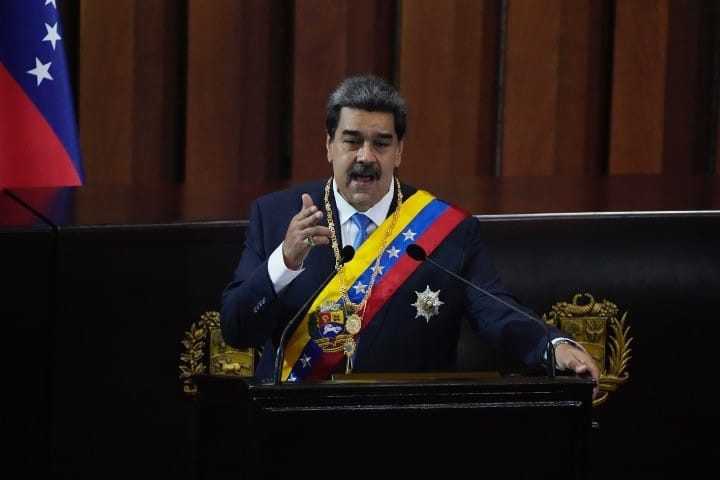
SINGAPORE — Venezuela has resurfaced as a prominent player in the world’s energy market, as the U.S. lifts oil sanctions on the country amid a global energy shortage.
The South American country produced more than three million barrels of oil daily 20 years ago, exporting 1.8 million barrels of that to the United States, but its abundant production was undermined by corruption and a fall in oil prices.
Former U.S. President Donald Trump had enforced sanctions against Venezuelan president Nicolas Maduro in 2019, but the Ukraine-Russia crisis since 2022 has tweaked U.S. priorities, and the U.S. has had to recalibrate relations with oil producers like Venezuela and Saudi Arabia on the grounds of reducing dependence on Russian energy.
In late 2022, U.S. President Joe Biden loosened sanctions on Venezuela in exchange for democratic reforms, which caused Venezuela to emerge again as a major oil source for the U.S. and Europe.
ORC Consulting Firm director and political analyst Oswaldo Contreras remarked: “The reality is that Venezuela became a real focus of attention for this reason. For the western world, it can be a relatively secure and trustworthy oil provider that can also support Europe.”
The last ten years witnessed the shrinking of the country’s oil sector by about two-thirds, and currently Venezuela produces less than 700,000 barrels daily. The loosening of sanctions could gradually increase that figure to over a million barrels, though observers contend that it still would require over a year for the country to attain that target, as considerable investment is needed in the oil sector following years of mismanagement.
In November, the U.S. said it would permit Chevron, the last American company to operate in Venezuela, to start obtaining oil in limited amounts there again. Chevron is involved in five onshore and offshore production projects in the country, and owns stakes in four joint ventures with state oil company PDVSA.
Mariana Vargas Carballo, an oil expert from Gas Energy Latin America, commented: “This license states that they are going to renew every month. It will be renewed every month for a period of six months maximum. And that gives you the perception that it is a trial test. It is not a long-term permit.” “We cannot expect a large increase in production,” she said. “At the beginning it is expected to extract about 100,000 to 150,000 barrels per day, but the maximum they can reach is 250,000 barrels per day.”
The recent U.S. move has been lambasted by Venezuelan opposition and activists, as well as some American lawmakers. These critics think that Washington is ignoring human rights abuses in the country.
Since 1999, Venezuela has been governed by an authoritarian socialist regime that holds a tight grip on all of the country’s public institutions and branches of power. The regime has unlawfully held on to power since 2019 via sham presidential elections in 2018, and control of the National Assembly through another round of sham elections in 2020.
Maduro, high-ranking members of the ruling United Socialist Party of Venezuela (PSUV), and the nation’s military have been singled out by the U.S. Drug Enforcement Administration (DEA) and other international organizations of helming the Cartel de los Soles (Cartel of the Suns), one of the largest intercontinental drug trafficking networks in the region.
The leftist regime in the country also enjoys widespread networks among other international criminal organizations, such as Colombia’s Marxist Revolutionary Armed Forces of Colombia (FARC), and members of the socialist regime have been directly blamed for their ties to international terrorist organizations. For instance, the regime’s oil minister, Tareck el Aissami, has been criticized for having links to the terrorist organization Hezbollah, whom the Maduro regime has sold Venezuelan passports to.
Additionally, a Transparency International report revealed that illegal business accounted for 21 percent of Venezuela’s entire GDP in 2021. The report also broached the issue of Venezuela’s mining arc, where criminal organizations “exercise vast control over gold mining operations, using extortion and paying off military commanders to maintain their illegal activities.” “These groups are responsible for human rights violations, including enforced disappearances, the killing of indigenous leaders and the displacement of their communities, forced prostitution, and labor exploitation of both adults and children, as well as contamination and other serious environmental crimes,” the report asserted.
The United Nations (UN), through its Independent Fact-Finding Mission, released a detailed report in 2020 confirming the control of the mining arc, where the criminal groups — notwithstanding the “considerable” presence of Venezuela’s military — participated in serious crimes like extortion, amputation, child labor, and the burying of living miners.
Maduro praised the recent U.S. moves, and even urged for a total cessation of all sanctions. “The licenses granted by the U.S. government, some of them known and some other unknown, they’re going on the right track, although they are not enough,” he said.
The Biden administration posited that future loosening of sanctions will hinge on further political deals, such as the release of political prisoners and free and fair Venezuelan elections in 2024.
Last year, Venezuela ranked as the most corrupt country in the Americas, with Haiti and other authoritarian regimes in the region like Cuba and Nicaragua trailing behind, based on Transparency International’s 28th Annual Corruption Perceptions Index.
The report listed Venezuela as the fourth most corrupt out of 180 countries, behind only Somalia, Syria, and South Sudan.
What is more, the report said, the top three most corrupt countries in the Americas, Nicaragua, Haiti, and Venezuela, are those whose public institutions have been corrupted by criminal networks, and hence “it is difficult to draw a line between public institutions and criminal activities” in those countries.
“Pervasive corruption across the Americas fuels the many other crises facing the region,” said Delia Ferreira Rubio, chair of Transparency International. “Weak governments fail to stop criminal networks, social conflict and violence, and some exacerbate threats to human rights by concentrating power in the name of tackling insecurity.”
“The only way forward is for leaders to prioritize decisive action against corruption to uproot its hold and enable governments to fulfill their first mandate: protecting the people,” Ferreira said, a suggestion likely to remain unheeded by Maduro, who has a $15 million U.S. bounty on his head for drug trafficking.



